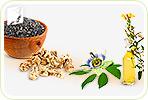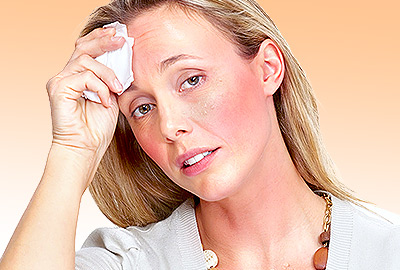Hot flashes are one of the most common symptoms of menopause, and a range of treatment options are available to manage them. Hot flashes are caused by drastically fluctuating levels of the hormone estrogen in the body. Estrogen plays a role in temperature regulation, and as estrogen levels shift, this can lead to hot flashes in many menopausal women.

Hot flashes affect upwards of 70% of women who are approaching menopause, and, for most women, last for a couple of years, but for others, can last for around 10 years.
Treating Hot Flashes
The most effective treatment for menopause in hormone replacement therapy (HRT). This medication adds estrogen to the body, and this estrogen helps treat menopause symptoms like hot flashes, night sweats, mood swings, and vaginal dryness.
However, HRT does increase the risk of certain diseases, so some women choose an alternative, such as an herbal remedy, or use herbs in addition to HRT. Many herbal remedies for treating hot flashes are marketed, though they have varying degrees of effectiveness:
- Soy. Soy contains phytoestrogens, which are compounds that act like estrogen to some extent in the human body. Research is split on what help, if any, phytoestrogens really provide when it comes to relieving menopause symptoms. However, some people point to the fact that women in Japan and other parts of Asia where people have diets rich in soy do not tend to suffer as much from menopause symptoms.
- Black cohosh. Black cohosh is one of the most popular treatments for menopausal symptoms. Block cohosh is endemic to North America and has traditionally been used by Native Americans to treat women's health problems. It also contains phytoestrogens, though they are different from soy's.
- Dong quai. Dong quai is an herb that originated in China and has been used to treat a variety of medical conditions, including menopause symptoms. Like all herbal supplements, it is recommended to consult with a doctor before beginning to take it.
- Macafem. Maca is a root vegetable from Peru that is frequently dehydrated and added to foods and beverages for its purported health benefits. Traditionally, it has been used to treat problems caused by hormonal imbalances, as it is thought to nourish the body's hormone-producing glands.

- Vitex (chasteberry). Chasteberry reduces the production of the hormone prolactin, so it may be effective when it comes to treating symptoms of PMS like breast pain. More research needs to be done to see if it impacts hot flashes as well.
- Wild yam. Wild yam extracts were used to develop the first modern birth control pills in the 1960's. Many wild yam extracts are used to treat menopause symptoms and other hormone-related conditions today. However, they are not effective because the substance in wild yams that turns into progesterone needs to be converted in a lab, it cannot be converted into a functional hormone naturally by the human body.
It is important to consult with a doctor before taking any herbal supplement. Even though herbs are natural, they still contain potent components that cause side effects and may interfere with other medicine or herbs a person is taking. Along with herbal remedies, lifestyle changes and prescription medicine can also help reduce hot flashes.
Sources
- Faure, E.D. , Chantre, P. & Mares, P. (2002). Effects of a standardized soy extract on hot flushes: a multicenter, double-blind, randomized, placebo-controlled study. Menopause, 9(5), 329-334. Retrieved from http://www.ncbi.nlm.nih.gov/pubmed/12218721
- Loch, E.G. , Selle, H. & Boblitz, N. (2000). Treatment of premenstrual syndrome with a phytopharmaceutical formulation containing Vitex agnus castus. Journal of Women's Health & Gender-based Medicine, 9(3), 315-320. Retrieved from http://www.ncbi.nlm.nih.gov/pubmed/10787228
- Office of Dietary Supplements. (2008). Black Cohosh. Retrieved October 30, 2015, from https://ods.od.nih.gov/factsheets/BlackCohosh-HealthProfessional/
- University of Maryland Medical Center. (2014). Dong Quai. Retrieved October 30, 2015, from https://umm.edu/health/medical/altmed/herb/dong-quai
- University of Maryland Medical Center. (2014). Wild Yam. Retrieved October 30, 2015, from https://umm.edu/health/medical/altmed/herb/wild-yam



